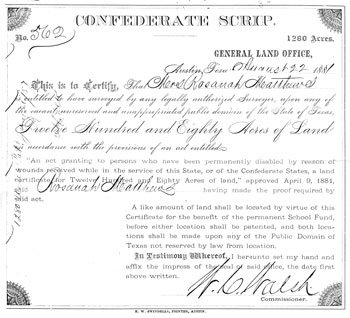One of the Texas land laws is very confusing. Supposedly women could not control property they owned or inherited. Women were seen as delicate creatures who needed a man to take care of all financial matters while the wife took care of the home, educated the children, and made the husband’s life easier, at home at least. Naturally this was not followed emphatically. During the Civil War many, if not most wives ran the business or farm/ranch.
Yet the law concerning women’s rights to property was in effect until changed in 1967 with enactment of marital-property section of the Family Code.
A definite side effect of the Civil War was the loss of so many men, leaving women alone. Some fathers, brothers, or elder sons if they had reached the age of majority took over. But such was not always the case.
In 1860 James C. Matthews and his wife Rosannah lived with their two sons on the boundary line of Tarrant and Parker Counties in North Texas. In 1862 James was drafted into the Confederate Army to guard the entry to Sabine Pass, Texas. While there he contracted yellow fever and died on January 14, 1864. Rosannah was left with three children under the age of five. In 1864 the State of Texas created Confederate Indigent Families Lists that provided assistance to families of men in service or who died in the service of Texas or the Confederate states. Listed under J. C. Matthews were six dependents. James and Rosannah had only three children, plus Rosannah so the identities of two persons in the home are unknown.
In November 1875 Rosanna sold 160 acres to T. P. Cummings for $350 in cash probably enough money to pay bills. No mention if this was all of the land she and James owned has been found.
In 1881 the Texas Legislature passed an act known as Confederate Scrip Grant on April 9, 1881. The purpose was to grant “to persons who have been permanently disabled by reason of wounds received while in the service of this States, or of the Confederate States, or to their widow, a land certificate for twelve hundred and eighty acres of land.” Vouchers provided relief to these individuals and families by allowing them to locate land or sell their certificate. All applicants had to prove that they did not have property valued at more than one thousand dollars. The program lasted only two years.
On August 8, 1881 Rosannah Matthews appeared before Judge R. E. Beckham and members of the Tarrant County Commissioners Court to apply for a land certificate for twelve hundred eighty acres under the act of the Texas Legislature approved April 9, 1881. The court approved the application with affidavits of R. L. Reynolds and H. T. Williams, two credible persons who agreed Mrs. Matthews met the requirements.
The 1280-acre survey was located in Webb County but was in conflict with a senior survey and relocated to an area located in Sutton and Crockett Counties. In 1886 Rosannah sold the Confederate Scrip Certificate to William Cassin for $150. Most likely Cassin was a land speculator buying and selling land certificates for pennies on the dollar. However, the move from Tarrant County to the small town of Encino would have been difficult for Rosannah Matthews, a fifty-five year old widow with three adult children who settled in North Texas.
Rosannah was able to sell the two properties without a husband or father to do it for her. When she signed the sale to William Cassin, her older son was a witness. No other evidence indicates they countered her decision. Some women managed quite well without a man’s advice.

